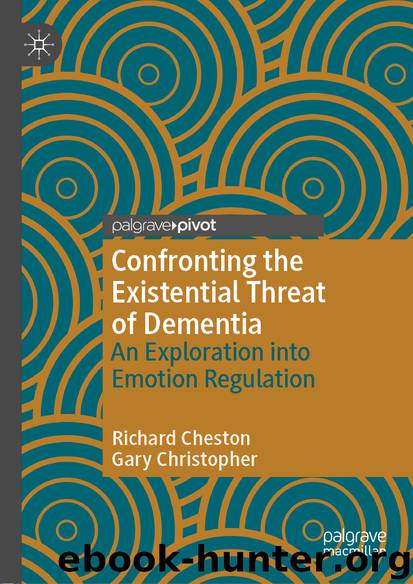Confronting the Existential Threat of Dementia by Richard Cheston & Gary Christopher

Author:Richard Cheston & Gary Christopher
Language: eng
Format: epub
ISBN: 9783030123505
Publisher: Springer International Publishing
The Role of Carers in Preserving Self-Esteem
This need to preserve the self-esteem of the person living with dementia, and their vulnerability to feelings of being diminished, is something that those around them often feel instinctively. Consequently, many caregivers and families take great care to build a protective shell around the person, in which they are insulated from the emotional and psychological consequences of their cognitive deficits. This was made very clear to us a few years ago, when we organised a series of focus groups for the families of people living with dementia. We used these focus group meetings as an opportunity to draw on the expertise that the families had built up over many years of caring for their partner or their parents to find out what they thought would be the best way to involve families in an intervention we were developing.
What the families told us in each of the focus groups was the same message—their priority was to maintain the person’s emotional state. All of them described the importance of maintaining a sometimes precarious sense of equilibrium. There was a strong sense of an implicit understanding being present within couples and families about there being something wrong (one woman said her mother described “a memory problem”), but generally, this was not articulated directly out of a fear that it would be upsetting. At the same time, the person affected by dementia may profoundly resent not being able to take the lead role in some activities especially when these are associated with their identity, and this resentment was often openly articulated. Often this ended up with rows and arguments, tears and conflict.
Due to their personal knowledge of the person living with dementia, families had an intuitive understanding of what their loved one found most threatening about their dementia—in particular they were afraid of the implications of dementia for their identity. For Anne’s mother it was the fear that she might forget her husband, who had died twenty years before. Beatrice spoke of how her husband was terrified that he would become like his own mother, who had died with dementia, not knowing who he was. Charles told the focus group of his wife’s deeply held fears that she would be forced into a Nursing Home and forgotten about. David described how his mother had always been too proud a woman to acknowledge any illness or change. Almost all of the people who attended the focus groups knew instinctively how dementia threatened the self-esteem of their husband, mother, or wife and consequently how it was important to protect them against the thought of the sort of person they might become.
For each of these people, the focus of the care that they provided was to avoid difficult encounters with these threats to identity. They tried to manage the lives of their loved ones so that such painful encounters with reality could be avoided as much as possible—because they saw the crushing effect that this had on the person’s self-esteem. Consequently,
Download
This site does not store any files on its server. We only index and link to content provided by other sites. Please contact the content providers to delete copyright contents if any and email us, we'll remove relevant links or contents immediately.
Men In Love by Nancy Friday(5234)
Everything Happens for a Reason by Kate Bowler(4734)
The Immortal Life of Henrietta Lacks by Rebecca Skloot(4581)
Why We Sleep by Matthew Walker(4435)
The Sports Rules Book by Human Kinetics(4379)
Not a Diet Book by James Smith(3411)
The Emperor of All Maladies: A Biography of Cancer by Siddhartha Mukherjee(3155)
Sapiens and Homo Deus by Yuval Noah Harari(3068)
Day by Elie Wiesel(2781)
Angels in America by Tony Kushner(2652)
A Burst of Light by Audre Lorde(2597)
Endless Forms Most Beautiful by Sean B. Carroll(2478)
Hashimoto's Protocol by Izabella Wentz PharmD(2371)
Dirty Genes by Ben Lynch(2314)
Reservoir 13 by Jon McGregor(2300)
Wonder by R J Palacio(2204)
And the Band Played On by Randy Shilts(2199)
The Immune System Recovery Plan by Susan Blum(2057)
Stretching to Stay Young by Jessica Matthews(2038)
